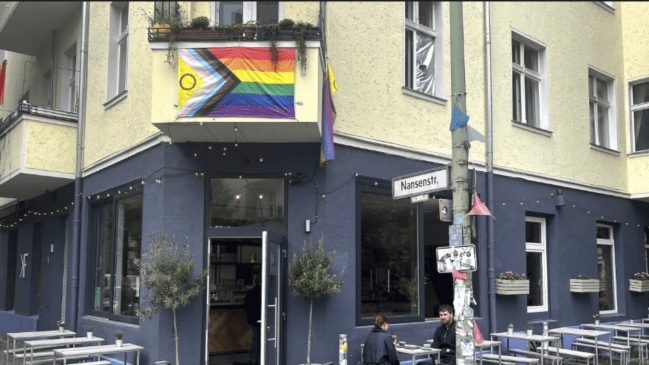Opinion Who’s my neighbour: Chandni Chowk in Germany, my immigrant soul and a cup of noon chai
I learned neighbourliness by doing it, until it settled in my muscles: holding parcels, translating letters, swapping recipes, noticing when a routine goes quiet
 The longer I live here, the more I think the only true “no-go” zone is the temptation to speak about a neighbourhood without letting it speak back (AP)
The longer I live here, the more I think the only true “no-go” zone is the temptation to speak about a neighbourhood without letting it speak back (AP) Everyone warned me about my new neighbourhood before I moved in. “Not safe.” “Too immigrant.” “A no-go area.” The labels came thick and casual, like weather talk. I had just landed in Germany with two squeaky suitcases and a folder full of proofs of existence — contracts, passport photos, bank statements — ready to start a fellowship in Berlin. I signed the lease anyway.
My flat is in Neukölln, a district in south Berlin where many Arab and Turkish families have built their lives over decades. Think of it as the Malviya Nagar of Delhi or Park Circus of Kolkata — dense, diverse, argumentative, generous. If you’ve never been to Germany, picture kebab shops and bakeries lining long, straight roads; a wide canal cutting through like a green ribbon; the metro train — breathing people up and down stairways; and languages braided in the air —German, Arabic, Turkish, English, and the shy Bengali I carry inside me.
On my first evening, the street met me like a crowded family photo. A football rolled into a florist’s bucket; roses rocked; the boy apologised; the shopkeeper laughed. A bakery slid open its shutter; the air filled with sesame and cardamom. The phrase “no-go” didn’t fit anywhere in my head. In those early days, I learned more German from shopkeepers than from any app. At the corner store, a cheerful “Kartenzahlung?”— card payment? — taught me how to pay without holding up the line. At the grocer’s, the aunty weighed parsley and slipped mint into my bag “for tea, Geschenk”— a gift. At the barber, “Habibi, next week—fresh cut!”.
Berlin’s bureaucracy is famous, and it arrived in my mailbox with insurance letters, registrations, deadlines. When one envelope stumped me, I carried it to the corner shop like a broken toy. The owner read it carefully, made two phone calls, and dictated my reply. When I offered a chocolate bar in thanks, he waved it away. “Neighbour,” he said. That one word did what no glossy “Welcome to Berlin” brochure could.
If you read European headlines, you’ll sometimes see a familiar anxiety: That the Stadtbild, the “cityscape”, is changing, that the city is losing its old face. A head of state recently complained along those lines. I understand the sentiment; cities do change, and change can unsettle. But I wish those debates would spend a day on my street.
Walking on a market day, along the canal — Maybachufer — stalls bloom with produce. Across the way, olives glisten like commas. I carry home the mint and make noon chai, the Kashmiri pink tea my grandmother loved. My Slavic flatmates toast buckwheat kasha in butter, then steam it till the grains open and turn nutty. Our hallway smells like an argument between grandmothers; nobody wins, everyone eats. Well, I won’t varnish Neukölln. There are sirens at night, arguments that flare up too loudly under windows, rents that climb like monsoon water. Still, as a brown guy navigating the Western world, feeling comfortable with my own colour of skin and as an immigrant is quite something; in Neukölln, it felt truthfully natural to me.
One Friday, a colleague asked where I lived. “Neukölln?” she repeated, the way people say “oh” when they want to say “why.” I told her about the barber who insists on my “next-week” haircut, the grocer’s mint, the corner-shop translator, the market laughs, the sunflower seeds traded by a Polish grandfather and a Palestinian teenager. “We have a cityscape too,” I said. “It just refuses to fit in a campaign poster.”
For readers in India who haven’t seen Berlin: Imagine Chandni Chowk (Delhi) with wider footpaths, Dadar market (Mumbai) with colder light, Mohammed Ali Road (Kolkata) during Ramzan but stretched across a year, and a metro that runs like a metronome. Now add the quiet that Germany is famous for — but make it the quiet of trust, not distance. That is Neukölln on most days. The stereotypes melt at human temperature.
The longer I live here, the more I think the only true “no-go” zone is the temptation to speak about a neighbourhood without letting it speak back. I learned neighbourliness by doing it, until it settled in my muscles: holding parcels, translating letters, swapping recipes, noticing when a routine goes quiet. Home, and even the address I claim, isn’t a certificate; it’s the people who answer when I knock.
The writer is a German Chancellor Fellow (2024–25) with the Alexander von Humboldt Foundation






